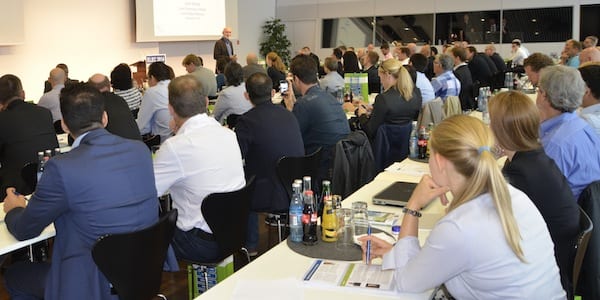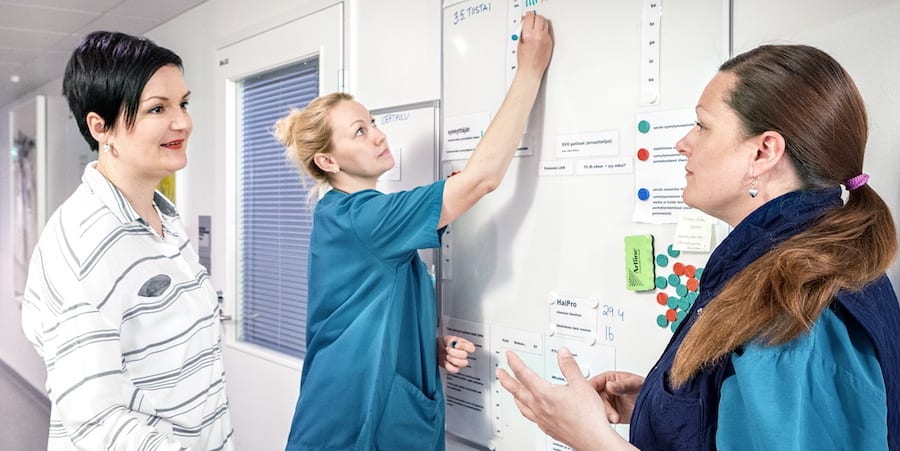
Lean minds hard at work
EVENT REVIEW – This year LGN and Ansbach University’s CEPTM co-organized the first European edition of the Lean Educator Conference. Planet Lean attended the event.
All too often, lean gets lost in translation. This happens on our shop floors and our offices, during our companies’ board meetings, in the discussions we have with one another.
In this context, universities and other institutions teaching lean (as the repositories and the creators of knowledge) have a very important role to play: to ensure that the core principles of the methodology are consistently passed on to students and practitioners with no room for misinterpretation or misunderstanding.
This lofty goal requires teaching bodies to discuss and learn from one another as much as possible, and to identify best practice in the delivery of training. This was one of the goals of the first European Lean Educator Conference, which took place in Stuttgart, Germany in September. This event had previously been held in the United States, and was brought to Europe this year with the aim to bring together academics to discuss the state of lean teaching in the Old Continent today.
Organized by Professor Constantin May from Ansbach University in partnership with the Lean Global Network, the conference provided the attendees with interesting topics to discuss and with many ideas to reflect on. It was an opportunity to share different experiences and interpretations of what teaching lean in high schools, universities, and organizations around the globe really means.
Lean courses in universities have always been extremely popular (in his opening remarks, LGN’s John Shook reminded the audience of the successful course he ran with Mike Rother at the University of Michigan in 1994), and their appeal is still very much intact. This is an opportunity the lean movement should not miss.
Over the years, the need for on-the-job, practical training has become more evident, which has encouraged universities and other institutions to put together new forms of teaching that go beyond the classroom and PowerPoint presentations.
Joakim Hillberg of the Swedish Lean Forum, for example, held a presentation exploring game-based teaching, while Giorgio Possio of Turin’s Lean Education Network shared the experience of working with high schools in the Italian city to help teachers to communicate lean principles to their students.
Several Lean Global Network members attended the conference (delegations came from the US, the UK, the Netherlands, Hungary, Italy, Turkey, Spain, Poland, and France). Many of them delivered presentations: Marie-Pia Ignace of the Institut Lean France, for example, talked about the Lean Academy initiative, which offers middle managers a one-year lean course and is proving very successful, while LEI Polska’s Professor Tomasz Koch encouraged lean educators to get out of the classrooms.
Not only did attendees have the opportunity to hear from professors, but they could also learn from training providers who taken lean teaching to the gemba (for instance, in faux factory floors and through simulation games).
Unsurprisingly, the improvement Kata methodology was in the spotlight throughout the conference, with Mike Rother often engaging in conversation with the speakers to constructively challenge their points or build on them.
Every session and workshop was followed by several questions, which led to often-animated discussion and gave the audience lots to think about. Networking breaks abounded, representing a great chance to dive deeper into the debate and to get to know fellow attendees.
René Aernoudts, President of the Netherlands-based Lean Management Instituut, said: “It was great to learn what educators and academics are offering their students. It was also refreshing to see that students become more and more knowledgeable on lean during their education, instead of only learning about it when they start to work.”
This conference stressed the importance of the role of academia and training providers in keeping the standards of lean knowledge high, and taught us a lot about what is going on in lean education across the world. It is a great learning opportunity for anyone interested in understanding how lean is (or should) be taught and communicated.
FOR AN INTERVIEW WITH PROFESSOR CONSTANTIN MAY, CLICK HERE
Read more


WOMACK'S YOKOTEN – Effective daily management is still hard to achieve for most organizations. But until line managers start tackling problems first hand as they emerge, rather than deferring and delegating them, basic stability will remain a mirage.


CASE STUDY – The whole of Helsinki’s hospital district is leaning out, with incredible results. It isn’t every day that we come across – let alone have the opportunity to observe – a lean transformation in such a large healthcare organization.


FEATURE – The role of experts in lean thinking is often the subject of heated discussions. Here, Michael Ballé tells us about the common mistakes lean experts make, and explains why – before helping others – they should help themselves.


INTERVIEW - What does "leading through incompetence" mean? Peter Willats discusses the role of leadership in a lean management system and the evolution of lean thinking.

